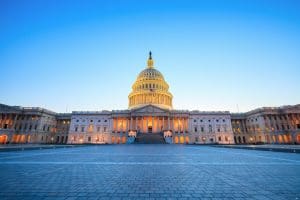The economic crisis caused by the coronavirus pandemic poses a triple challenge for tax policy in the United States. Lawmakers are tasked with crafting a policy response that will accelerate the economic recovery, reduce the mounting deficit, and protect the most vulnerable.
To assist lawmakers in navigating the challenge, and to help the American public understand the tax changes being proposed, the Tax Foundation’s Center for Federal Tax Policy modeled how 70 potential changes to the tax code would affect the U.S. economy, distribution of the tax burden, and federal revenue.
In tax policy there is an ever-present trade-off among how much revenue a tax will raise, who bears the burden of a tax, and what impact a tax will have on economic growth. Armed with the information in our new book, Options for Reforming America’s Tax Code 2.0, policymakers can debate the relative merits and trade-offs of each option to improve the tax code in a post-pandemic world.

Phasing in a Corporate Rate Hike Would Be the Worst of Both Worlds
The Biden administration has signaled its openness to raising the corporate tax rate, potentially by phasing in an increase over several years. While phasing in a tax increase, as opposed to hiking immediately, may seem like a reasonable middle ground, it would be the worst of both worlds because it provides old investment with a lower rate while penalizing new investment.
2 min read
Kentucky’s Century-Old Gas Tax Is Failing to Keep Up with Road Funding Needs
For the fourth year in a row, a comprehensive infrastructure funding reform bill has been introduced in Kentucky, with the centerpiece being a gas tax increase of 8.6 cents per gallon (cpg). Like many states, Kentucky faces a backlog of road maintenance and construction projects, and existing transportation taxes and user fees are failing to keep pace with funding needs.
4 min read
Senate Direct Payment Design Would Create High Implicit Marginal Tax Rates
As the Senate debates the relief package and makes progress in the budget reconciliation process, policymakers should keep in mind the trade-off between targeted economic relief and increasing marginal tax rates in the tax code, which can distort incentives to earn income and induce taxpayers to creatively adjust their AGI to receive a payment in the next tax season.
4 min read
New Hampshire Bill Aims to Reduce Tax Burden on Businesses
A year ago, it seemed possible that New Hampshire was headed toward a triggered tax increase. Instead, lawmakers may trim business tax rates and begin the phaseout of the state’s tax on interest and dividend income, which would take away the asterisk and make New Hampshire the ninth state to forgo an individual income tax altogether.
4 min read
Tax Incentives for Digital Nomads and Remote Workers
Policy changes to attract foreigners are not without benefits, but governments should carefully weigh the costs of the tax incentives against opportunities to implement broader tax reforms. A more efficient income tax system is a better objective than just focusing on incentives for foreigners to change their tax residence.
4 min read
Lawmakers Reintroduce Bill to Protect Against Double Taxation of Financial Transactions
With several states entertaining proposals to tax the financial transactions of savers and investors who don’t even live in their states, some members of Congress see an interstate commerce question worthy of a federal response.
6 min read
State Aid in American Rescue Plan Act Is 116 Times States’ Revenue Losses
Here’s each state’s estimated revenue gains or losses in 2020, alongside the state and local aid that would be allocated to each under the American Rescue Plan Act.
8 min read
An Investment Boost in the UK’s 2021 Budget
The UK’s Chancellor of the Exchequer Rishi Sunak released the 2021 budget, and most important for near-term growth is the significant boost to capital allowances.
5 min read
Sen. Elizabeth Warren’s Wealth Tax Legislation Faces Administrative and Economic Challenges
The international experience with wealth taxes should serve as a warning to the U.S. A wealth tax would reduce the size of the economy, shrink national income, and significantly distort international capital flows.
4 min read
The UK Should Not Ignore Problems with its Corporate Tax Base
While the UK is looking at ways to raise tax revenue to cover the revenue shortfalls and additional spending resulting from the COVID-19 pandemic, short- as well as long-term, investment will be crucial in getting the economy back on track and ensuring economic growth.
3 min read